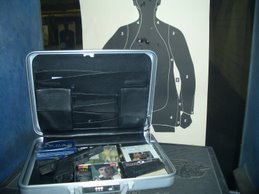However, Gertrude Stein is my personal patron of the plate. Although hailing from Allegheny, Pennsylvania, she lived in Paris with her life long lesbian lover Alice Toklas. Together, they hosted a salon that ushered in the avant-garde in the early 20th century.
She described her guests as the "Lost Generation,” which included: Pablo Picasso, Henri Matisse, André Derain, Georges Braque, Juan Gris, Ernest Hemingway ("Hemingway, remarks are not literature"), Ezra Pound, Thornton Wilder, Sherwood Anderson, Guillaume Apollinaire, and Paul Bowles (whom I practically worship) among others. Who knew that cordials, conversation and cuisine could shape 20th century culture?
I had recent occasion to visit Gertrude in Paris. She now resides in the world’s most fashionable necropolis, Père Lachaise Cemetery. I like to frequent it often to visit old friends, from Abelard and Heloise to Chopin to Edith Piaf and many others. Maria Callas use to be a tenant, but her ashes were kidnapped, recovered, and then scattered across the Aegean Sea. Callas is as complex in death as she was in life.
We can only aspire to crawl in Stein’s long shadow. Recently, the Pentagon Diva and I hosted an “Opera Gala Dinner,” for a few kindred souls, including the indefatigable Her Majesty Maeve. It was magnificent. We find it is best to start with a bottle of wine per person and one for the table. Here’s the menu (sans accompanying opera):

Il Condottiero and Pentagon Diva’s
Opera Gala Dinner
Apéritif
Champagne von Fledermaus
Johann Strauss Jr’s Die Fledermaus, Act 2 chorus “Champagne the Great!”
L'Antipasto
Assortment of cheese, fruits and wine a la The Magic Flute
Mozart’s Die Zauberflöte, Act 2 chorus “Seid uns zum zweitenmal wilkommen”
Il Primo
Artichokes Zuppa di Tabarro
Puccini’s Il Tabarro, choking duet “T’ho Colto!”
Il Secondo
Flank of Valkurie
Wagner’s Die Walküre, Act 3, “Ride of the Valkyries”
Aida Battle Spears of Asparagus
Verdi’s Aida, Act 2 post-battle “Grand Triumphal March”
Druidic Mushroom Risotto di Norma
Bellini’s Norma, Act 2 Roman-Druid duet “In mia man alfin tu sei”
Intermezzo
Mascagni’s Cavalleria Rusticana, Intermezzo
Il Dolce
Falstaff’s Alcoholic Cheesecake with Hänsel und Gretel Strawberry Sauce
Verdi’s Falstaff, the whole thing
Humperdinck’s Hänsel und Gretel, Act 1, the strawberry-picking expedition
Honey-Nut Fruitcake a la Salome
Strauss’s Salome, final scene
Digestif
Myriad Cordials
Offenbach's Les Contes d'Hoffmann, "Belle Nuit, O Nuit D`amour"
Don Giovanni cognac
Traviata port
Lammermoor scotch
“Girls of the Golden West” bourbon
Masked Ball aquavit
Boris Godunov vodka variations
The Bartered Bride’s dancing bear honey-liquors
If I could magically conjure anyone to my perfect dinner party, whom would I invite? Well, aside from the living, certainly the dead. I would start with the following: Oscar Wilde, George Bernard Shaw (also a classical music critic!), Voltaire, Dorothy Parker, Shakespeare, Mark Twain, and Gertrude Stein, at her old pad on 27 Rue de Fleurus. Wit combined with genius is potent stuff indeed.














